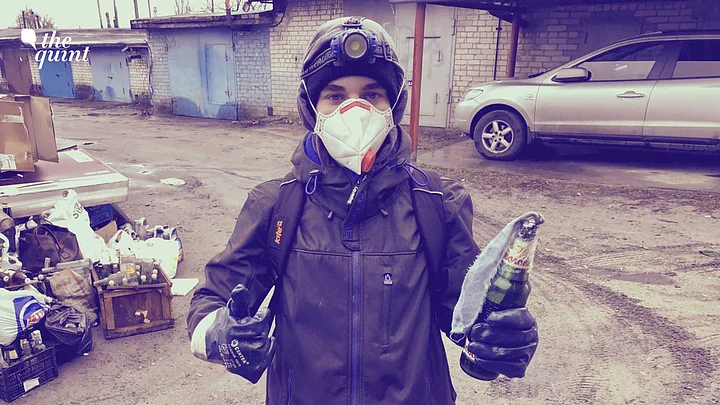Russia's invasion of Ukraine has sparked a resistance amongst the Ukrainian people that has amazed observers and analysts.
A key feature of this resistance has been an incendiary weapon consisting of simple ingredients that can be found in most households:
A glass bottle (beer or soda)
Some flammable liquid (gasoline or alcohol)
A cloth rag to fix around the opening of the bottle
A lighter or a matchbox
In the past two weeks, stunning pictures and videos have gone viral showing Ukrainians huddling together and making Molotov cocktails, after which they load them onto crates.
This picture, for instance, shows disabled people in wheelchairs making Molotov cocktails in Chernivtsi, a city in western Ukraine.
Other snippets like the one below show Ukrainians stacking together what appears to be thousands of Molotov cocktails.
So, what exactly are Molotov cocktails? How did this name come about? And what do they symbolise?
What are Molotov Cocktails?
Molotov cocktails are basically improvised incendiary devices consisting of a breakable glass bottle with a flammable substance inside it.
A cloth is tied around the opening of the bottle, and the objective is to light the cloth and immediately hurl the bottle towards the target, causing it to explode when the flame comes in contact with the flammable substance.
These were used for the first time in warfare during the Spanish Civil War that was fought between 1936 and 1939.
In his book, A Frozen Hell: The Russo-Finnish Winter War of 1939-40, William Trotter wrote that General Francisco Franco ordered the Spanish Nationalist forces to use Molotov cocktails (not referred to by that name at the time) against the Soviet T-26 tanks aiding the Spanish Republicans.
The origins of the name of this weapon, however, go back to The Winter War (the First Soviet-Finnish War).
Why 'Molotov Cocktails'?
The fascinating origin of the name can be traced back to Vyacheslav Molotov, foreign minister of the Soviet Union between 1939 and 1949.
He served in the Stalin government for three decades, with many historians considering him as Stalin's most loyal supporter.
During the Winter War of 1939-1940, the Soviets were dropping bomb after bomb on Finland.
Molotov, however, for the purposes of propaganda, infamously declared on Soviet state radio that bombs were actually airborne humanitarian food baskets to help the starving Finnish people.
The Finns sarcastically referred to the Soviet bombs as "Molotov bread baskets", and they thought they should add a drink alongside the food.
The bottled petrol bombs or alcohol bombs that the Finns used to attack Soviet tanks, therefore came to be known as "Molotov cocktails".
Symbolism of Molotov Cocktails
Molotov cocktails are nothing in front of an automatic rifle or a tank. They can, nevertheless, cause a lot of damage to the enemy, even to tanks.
This pamphlet below distributed across Ukraine explains how to use the homemade weapon most effectively.
Indeed, a Molotov cocktail can set ablaze and melt the wheels of tanks, bringing them to a halt. It can also create technical problems, despite the heavy armoury that protects the inside of the tanks.
The ease with which this weapon can be assembled has made it a symbol of civil uprising and revolution.
One alternate name for the Molotov cocktail is 'poor man's grenade'.
It also symbolises the courage and willpower of the underdog in a violent conflict. Statistics provided here clearly show that the Russian military outmatches Ukrain's forces by a huge margin.
The Ukrainian people, however, are not allowing the military asymmetry to drag them down.
A Molotov cocktail, therefore, is just one of the many symbols of resistance that has stalled the advance of Russian ground troops in Ukraine.
(At The Quint, we question everything. Play an active role in shaping our journalism by becoming a member today.)
